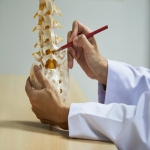One of the most common questions that patients consider having spinal surgery is: "Who is better, an orthopedic surgeon or a neurosurgeon?" The answer is that both trained orthopedic surgeries and neurosurgeries are included in most forms of spine surgery. This article describes the similarities and differences between the two specialties and offers more guidance on the choice of a neurosurgeon in Oklahoma.
Due to the familiar conception of the bony spinal column, spine surgery is often associated with orthopedics. The spinal column, consisting of multiple vertebras, offers structural support and body flexibility.
The backbone also protects delicate neural structures such as the spinal cord and the roots of the nervous system. Essentially, the spinal cord is a reproduction of the brain and even the least trauma can lead to irreversible damage which can lead to fatigue, sensory deprivation or paralysis.
The spinal column also contains essential channels that provide the spinal cord with oxygen. Blood vessel trauma can also lead to irreversible damage to the spinal cord.
If there are degenerative changes in the spinal column, the spinal or nerve roots can be compressed by the bony elements. Likewise, herniated disks can also pinch the spine and cause serious damage to the nerve.
Neuroscience specialists in OKC are specialized in the treatment of nervous system conditions, including the brain and spinal cord.
Such conditions can include tumors, trauma, vascular damage, or degenerative changes that result in essential neural structures being compressed. Usually, neurosurgery residence takes 7 to 8 years and about 50% of learning is spinal surgery. In addition to residency, spinal fellowships may be pursued for purposes of intensive specialized training for spinal surgery.
Orthopedic surgeons are specialized in treating musculoskeletal disorders. An orthopedic residency usually takes five years and the time spent on spinal surgery often varies. Therefore, most orthopedic surgeons follow backbone fellowships to improve skills in spinal surgery following residence.

Neurosurgeons
Neurosurgeons could be medical doctors and have five to six years of residency in the department of surgical treatment of neurological conditions. They are trained in diagnosing and treating disorders related to the brain, spinal cord, nerves, etc.
Many neurosurgeons are primarily trained in brain procedures, some in spine surgery, and some split their training.

Orthopedic Surgeons
Medicine doctors (MD) who have completed a five-year surgical residency with a particular focus on musculoskeletal conditions may be orthopedic surgeons. Orthopedists specialize in diagnosing and treating nearly all disorders of the bone and joint, like arthritis, trauma, bone tumors, spinal disorders, joint replacement, etc.
Many orthopedic surgeons focus their work only on spinal cord surgery, some on other forms of joints (for example hips, knees, shoulders).
All neurosurgeons and orthopedic surgeons might complete training to perform most types of spinal surgery, but a number of types of spinal surgery tend to be more eligible for one specialty than the other, such as:
-
In the past, orthopedic surgeons were more skilled than other forms of spinal deformations, such as scoliosis. Most neurosurgeons have been qualified today in deformity surgery.
-
Neurosurgeons tend to be more qualified for intradural surgery (inside the spinal cord, hard surgery), such as the sac cell tumors.
Contact neurosurgeon in Oklahoma at Neuroscience Specialists.
**Information presented here is not intended to be qualified for medical advice. Nothing expressed herein creates a doctor-patient relationship.

